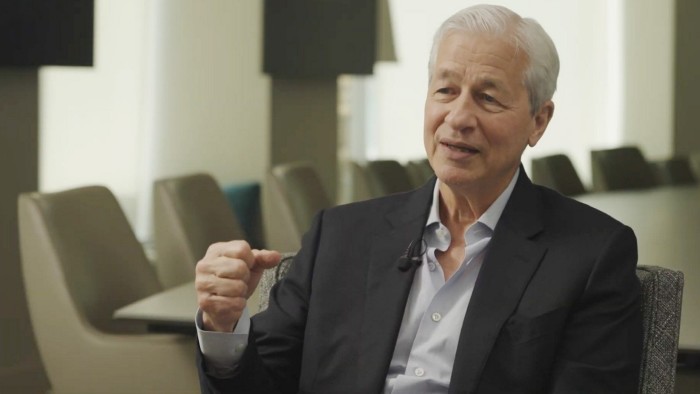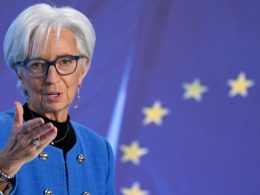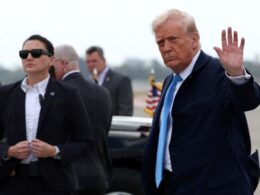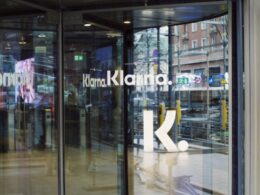Unlock the Editor’s Digest for free
Roula Khalaf, Editor of the FT, selects her favourite stories in this weekly newsletter.
Donald Trump’s trade war risks eroding the US’s credibility, Jamie Dimon warned, as the JPMorgan Chase chief executive urged Washington to “engage” with Beijing.
Dimon said that the US remained “a haven” because of its prosperity, rule of law, and economic and military strength, but that America’s economic pre-eminence could come under threat from the president’s attempt to reshape global trade.
“A lot of this uncertainty is challenging that a little bit. So you’re going to be reading about this nonstop until hopefully these tariffs and trade wars settle down and go away so people can say, I can rely on America,” Dimon said in an interview with the Financial Times.
He urged the US and China to engage with each other: “I don’t think there’s any engagement right now . . . it doesn’t have to wait a year. It could start tomorrow.”
Dimon’s comments come after Trump’s April 2 “liberation day” announcement of steep “reciprocal” tariffs on many countries sparked a new trade war and triggered wild swings on Wall Street.
Investors last week rushed away from US government debt, sending 10-year yields surging the most in decades, as Trump’s swerves on trade policy and attacks on independent regulators prompted some investors to question America’s long-standing role as the world’s leading market.
“We should be careful. I don’t think anyone should assume they have a divine right to success and therefore don’t worry about it,” Dimon said.
The JPMorgan chief said the market ructions following “liberation day” were “disorderly to the extent that it was a rapid move”, but that “most of the markets were fine”. He added: “The markets are very volatile, it scares people.”
Dimon, who has run the largest US bank for almost two decades, is one of the most influential voices on Wall Street. Trump cited Dimon’s warning last week that tariffs could tip the economy into recession when he moved to pause most “reciprocal” tariffs — something that helped ease market jitters.
“When they announced the liberation day tariffs, they were dramatically different than people expected. Way off the table than what people expected. And that was shocking to the system. The global system, not just in the United States,” Dimon said.
Trump has so far declined to remove tariffs of as much as 145 per cent on many Chinese imports, although his administration at the weekend created a carve-out for consumer electronics.
“I think we should be clear-eyed about what we’re trying to accomplish,” Dimon said, referring to the president’s tariff regime.
“And I also think we should do it with allies . . . I would want to negotiate eventually with Europe, with the UK, with Japan, Korea, Australia, Philippines, and have a very strong economic relationship.”
Dimon, who has been floated for years as a potential pick for Treasury secretary, also expressed optimism that Scott Bessent, the current holder of that job, could steer the US economy through choppy waters.
“I hope so,” Dimon said. “I know him a little bit. I think he’s an adult. I don’t agree with everything the administration is doing. So I’m not arguing that point. But I think he’s the guy who should probably be negotiating these trade agreements.”
In a wide-ranging interview, Dimon also weighed in on the White House’s approach to Wall Street, talked about the best strategy for corporate America to navigate the Trump era, and discussed his annual bus tour through the US.
Dimon, 69, faces regular questions about who will eventually follow him as chief executive of JPMorgan, with a number of potential candidates coming and going over the years. He said the crucial qualities he will look for in his successor were courage, curiosity, grit, heart and capability.
He said all the current candidates for the job, who are believed to include top executives Marianne Lake, Troy Rohrbaugh and Doug Petno, had these qualities to “varying degrees”.
Dimon, who has also been mentioned over the years as a potential presidential candidate, said the closest he ever got to exploring a bid for the White House was asking “one person once, what does it even entail?” and quickly concluded it was not for him.
Once he eventually steps back from JPMorgan, Dimon said “there’s a little media thing I may do when I’m done with this job”.
“It could be a competitor or an aid [to the FT],” he said. “It’s something I think all the papers should be doing. But I’m not going to tell you what it is right now.”
Source link









